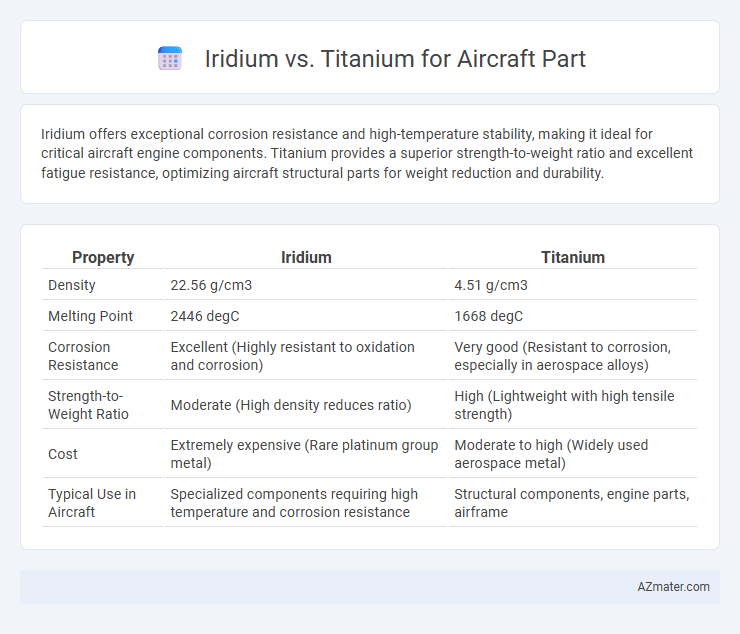Iridium offers exceptional corrosion resistance and high-temperature stability, making it ideal for critical aircraft engine components. Titanium provides a superior strength-to-weight ratio and excellent fatigue resistance, optimizing aircraft structural parts for weight reduction and durability.
Table of Comparison
| Property | Iridium | Titanium |
|---|---|---|
| Density | 22.56 g/cm3 | 4.51 g/cm3 |
| Melting Point | 2446 degC | 1668 degC |
| Corrosion Resistance | Excellent (Highly resistant to oxidation and corrosion) | Very good (Resistant to corrosion, especially in aerospace alloys) |
| Strength-to-Weight Ratio | Moderate (High density reduces ratio) | High (Lightweight with high tensile strength) |
| Cost | Extremely expensive (Rare platinum group metal) | Moderate to high (Widely used aerospace metal) |
| Typical Use in Aircraft | Specialized components requiring high temperature and corrosion resistance | Structural components, engine parts, airframe |
Introduction to Iridium and Titanium in Aerospace
Iridium and titanium are critical materials in aerospace engineering due to their exceptional properties; iridium offers outstanding corrosion resistance and high melting point, making it ideal for harsh environments like jet engine components. Titanium is favored for its high strength-to-weight ratio, excellent fatigue resistance, and biocompatibility, often used in structural airframe parts and aircraft engine components. The combination of iridium's durability and titanium's lightweight strength enhances aircraft performance and longevity in demanding aerospace applications.
Material Properties: Iridium vs Titanium
Iridium exhibits exceptional corrosion resistance, high melting point of 2446degC, and superior hardness, making it ideal for extreme high-temperature aircraft parts exposed to oxidizing environments. Titanium, with a melting point of 1668degC, offers an excellent strength-to-weight ratio, outstanding corrosion resistance, and good fatigue performance, which is crucial for structural components requiring lightweight durability. While titanium is preferred for reducing overall aircraft weight, iridium's unique ability to withstand harsh thermal and chemical conditions makes it indispensable for specialized engine and exhaust system components.
Weight Considerations in Aircraft Part Selection
Iridium, known for its exceptional corrosion resistance and high density, poses weight challenges when used in aircraft parts compared to titanium, which offers a superior strength-to-weight ratio critical for aerospace applications. Titanium's low density of approximately 4.5 g/cm3 versus iridium's density of around 22.5 g/cm3 significantly reduces overall aircraft weight, enhancing fuel efficiency and performance. Weight considerations heavily favor titanium in aircraft part selection, where minimizing mass without compromising durability is essential for optimal aerodynamics and cost-effectiveness.
Corrosion Resistance Capabilities
Iridium exhibits superior corrosion resistance compared to titanium, especially in highly aggressive environments such as marine or chemical exposure due to its stable oxide layer and high density. Titanium, while corrosion-resistant in many aerospace applications, is more susceptible to localized corrosion like pitting and crevice corrosion under certain conditions. For aircraft parts requiring exceptional durability against oxidation and corrosive agents, iridium's properties provide enhanced longevity despite its higher cost and weight compared to titanium.
Temperature Tolerance and Performance
Iridium exhibits exceptional temperature tolerance, maintaining structural integrity at temperatures exceeding 2000degC, making it ideal for high-heat aircraft engine components. Titanium offers excellent strength-to-weight ratio and corrosion resistance, with operational limits around 600degC, suitable for airframe and moderate-heat sections. Iridium's high melting point and oxidation resistance provide superior performance in extreme thermal environments compared to titanium's balanced mechanical properties optimized for overall aircraft durability.
Cost Analysis: Iridium versus Titanium
Iridium aircraft parts exhibit significantly higher material and manufacturing costs compared to titanium due to iridium's rarity and challenging machining requirements. Titanium offers a more cost-effective solution with its abundant availability and established fabrication processes, maintaining high strength-to-weight ratios essential for aerospace applications. Lifecycle expenses further favor titanium, as its superior corrosion resistance reduces maintenance and replacement costs over time relative to iridium components.
Manufacturing and Machining Differences
Iridium offers exceptional corrosion resistance and high-temperature stability, making it ideal for aerospace components exposed to extreme environments, but its brittleness complicates machining and requires specialized tools and techniques. Titanium provides a superior strength-to-weight ratio and is more ductile, allowing easier fabrication and machining with conventional equipment, leading to lower manufacturing costs and faster production cycles. The choice between iridium and titanium depends on performance requirements, with iridium preferred for extreme durability and titanium favored for lightweight structural parts.
Common Aircraft Parts Made from Iridium and Titanium
Iridium is primarily used in aircraft spark plugs and engine components due to its exceptional high-temperature resistance and corrosion durability, enhancing ignition efficiency and engine performance. Titanium is widely utilized for structural parts like airframes, engine pylons, and landing gear because of its high strength-to-weight ratio and excellent corrosion resistance, contributing to overall aircraft weight reduction and fuel efficiency. Both metals are critical in aerospace engineering, with iridium favored for wear-resistant, high-temperature applications and titanium chosen for lightweight, load-bearing components.
Longevity and Maintenance Factors
Iridium offers exceptional corrosion resistance and high-temperature stability, making it ideal for critical aircraft components exposed to extreme environments, resulting in longer lifespan and reduced maintenance frequency. Titanium is favored for its excellent strength-to-weight ratio and resistance to fatigue and wear, which enhances structural longevity while simplifying routine inspections and repairs. Both metals contribute significantly to aircraft durability, but iridium's superior endurance under severe conditions often reduces overall maintenance needs compared to titanium.
Future Trends in Aircraft Material Selection
Iridium's exceptional corrosion resistance and high-temperature stability make it ideal for critical aircraft components exposed to extreme conditions, while titanium offers superior strength-to-weight ratio and excellent fatigue resistance, driving its widespread use in structural parts. Future trends in aircraft material selection prioritize lightweight alloys and advanced composites to enhance fuel efficiency and reduce emissions, with research focusing on hybrid materials incorporating titanium for structural integrity and iridium coatings for thermal protection. Innovations in additive manufacturing and nanotechnology aim to optimize the performance and durability of iridium-titanium composites, accelerating the adoption of these materials in next-generation aerospace designs.

Infographic: Iridium vs Titanium for Aircraft Part
 azmater.com
azmater.com